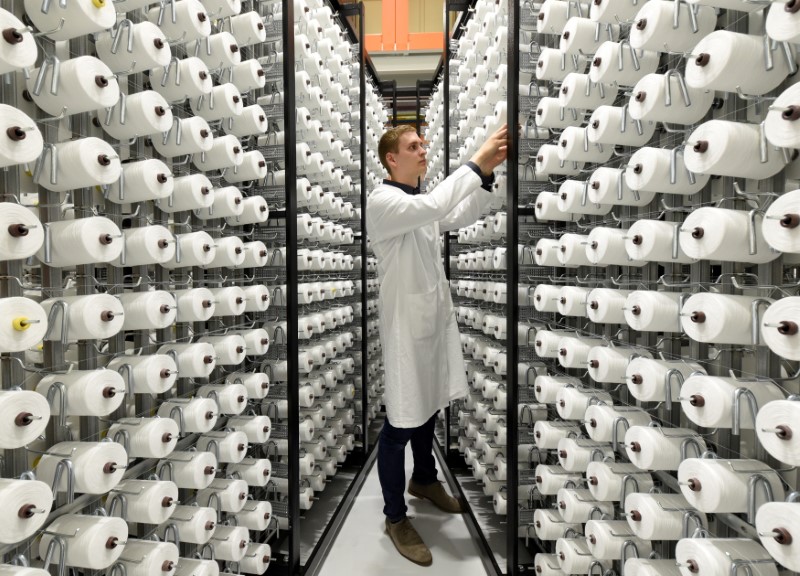 © Reuters. FILE PHOTO: An employee checks spools of plastic fibre in a giant loom at the Open Hybrid Lab Factory, which is a research and development center of several companies like German car maker Volkswagen, in Wolfsburg
© Reuters. FILE PHOTO: An employee checks spools of plastic fibre in a giant loom at the Open Hybrid Lab Factory, which is a research and development center of several companies like German car maker Volkswagen, in WolfsburgBERLIN (Reuters) – German imports fell unexpectedly in November, outstripping a drop in exports and widening the trade surplus, data showed on Wednesday, in a further sign that Europe’s largest economy is likely to post meager growth in the fourth quarter of 2018.
The weak trade figures followed industrial output data on Tuesday that showed production fell for the third month in a row in November as risks from abroad mount and car companies struggle with new emission standards.
Seasonally adjusted imports fell by 1.6 percent on the month in November while exports edged down 0.4 percent, the Federal Statistics Office said. The trade surplus widened to 19.0 billion euros ($21.78 billion) from an upwardly revised 17.9 billion euros.
A Reuters poll of economists had pointed to an unchanged reading for imports and a 0.3 percent fall in exports.
“We’ve have seen a string of weak economic data, but I don’t expect a technical recession for the end of 2018,” Stefan Kipar from BayernLB said.
“After the weak third quarter, there’ll likely be a catch-up effect, but growth will probably be weak in the fourth quarter,” Kipar added.
The German economy contracted by 0.2 percent from July to September.
Trade disputes driven by U.S. President Donald Trump’s ‘America First’ policies, the threat that Britain could leave the EU without a deal and weaker growth in emerging markets are putting the brakes on a nine-year expansion in Germany.
The car industry is also struggling with bottlenecks in new car registrations due to the introduction of stricter pollution standards earlier this year.
“There currently simply seem to be too many crises in global trade for the German export sector to defy them. Even the weak euro has done very little to lift German export performance,” Carsten Brzeski from ING Bank said.
The Federal Statistics Office will publish preliminary gross domestic product growth data for the fourth quarter and 2018 as a whole next Tuesday.
Economy Minister Peter Altmaier last month lowered the government’s growth forecast for 2018 to around 1.5 to 1.6 percent, down from the previous estimate of 1.8 percent. For this year, Berlin predicts a 1.8 percent expansion.
($1 = 0.8723 euros)
Fusion Media or anyone involved with Fusion Media will not accept any liability for loss or damage as a result of reliance on the information including data, quotes, charts and buy/sell signals contained within this website. Please be fully informed regarding the risks and costs associated with trading the financial markets, it is one of the riskiest investment forms possible.
Source: Investing.com





























